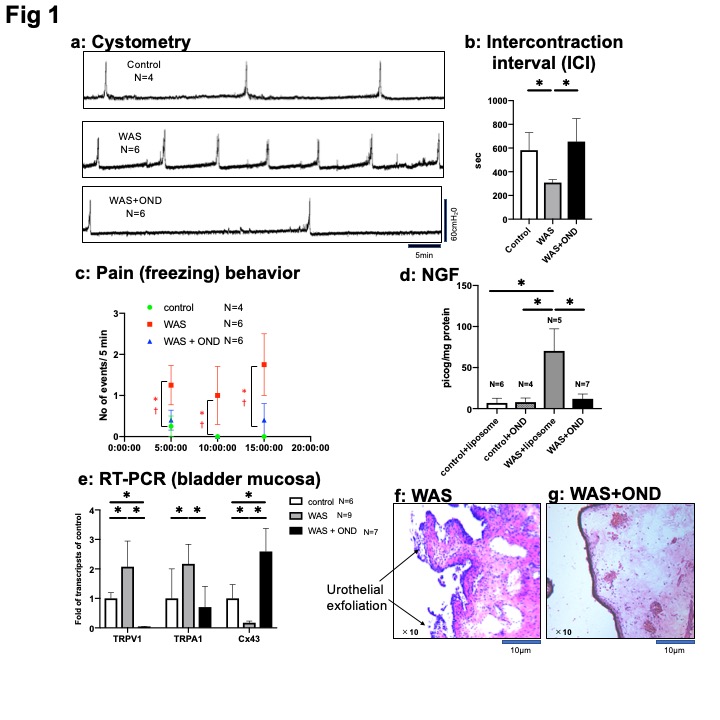Back
Poster, Podium & Video Sessions
Moderated Poster
MP49: Urodynamics/Lower Urinary Tract Dysfunction/Female Pelvic Medicine: Basic Research & Pathophysiology
MP49-05: Intravesical nerve growth factor-targeting therapy using liposome-conjugated antisense in rats with stress-induced bladder hypersensitivity
Sunday, May 15, 2022
4:30 PM – 5:45 PM
Location: Room 228
Tetsuichi Saito*, Matsumoto, Japan, Pradeep Tyagi, Taro Igarashi, Pittsburgh, PA, Tomonori Minagawa, Teruyuki Ogawa, Osamu Ishizuka, Matsumoto, Japan, Naoki Yoshimura, Pittsburgh, PA
- TS
Poster Presenter(s)
Introduction: Psychological stress has been implicated as an etiological factor of bladder hypersensitive disorders such as bladder pain syndrome/interstitial cystitis (BPS/IC). Also, upregulation of nerve growth factor (NGF) in the bladder, which is detected in BPS/IC patients, is shown to be an important factor inducing bladder hypersensitivity in animal models. Thus. this study investigated the relationship of NGF in the bladder and bladder hypersensitivity caused by psychological stress induced by water avoidance stress (WAS) in rats, and examined whether an intravesical therapy using liposome-conjugated NGF antisense oligonucleotide (OND) can improve the WAS-induced bladder hypersensitive condition.
Methods: Female Wistar rats were used and divided into sham control, WAS and WAS with OND treatment groups. The WAS with OND rats were treated with NGF antisense OND on the day before the first WAS session. After 1-hour WAS or sham sessions once daily for 10 days, the rats were evaluated by cystometry or pain behavior measurements followed by bladder histology. In another set of animals without functional evaluation, the bladder was harvested for molecular studies.
Results: Rats exposed to 10-days WAS showed shortened inter-contraction intervals (ICI) and increased pain behaviors, compared to control rats, which were improved with OND treatment (Fig 1-a,b,c). Protein assay showed increased NGF levels in the bladder mucosa in WAS rats, which were decreased by OND treatment (Fig 1-d). RT-PCR showed increases of TRPV1 and TRPA1 and a decrease in Cx43 in the bladder mucosa of WAS rats compared to control rats, which were improved in WAS rats treated with OND (Fig 1-e). Bladder histology revealed urothelial exfoliation in WAS rats, which was recovered with OND treatment (Fig 1-f,g).
Conclusions: Psychological stress induced by WAS elicited bladder hypersensitivity, which was improved by NGF antisense OND treatment. Thus, liposome-based local suppression of upregulated NGF in the bladder could be an effective therapeutic modality for bladder overactivity and enhanced pain sensation induced by psychological stress.
Source of Funding: None

Methods: Female Wistar rats were used and divided into sham control, WAS and WAS with OND treatment groups. The WAS with OND rats were treated with NGF antisense OND on the day before the first WAS session. After 1-hour WAS or sham sessions once daily for 10 days, the rats were evaluated by cystometry or pain behavior measurements followed by bladder histology. In another set of animals without functional evaluation, the bladder was harvested for molecular studies.
Results: Rats exposed to 10-days WAS showed shortened inter-contraction intervals (ICI) and increased pain behaviors, compared to control rats, which were improved with OND treatment (Fig 1-a,b,c). Protein assay showed increased NGF levels in the bladder mucosa in WAS rats, which were decreased by OND treatment (Fig 1-d). RT-PCR showed increases of TRPV1 and TRPA1 and a decrease in Cx43 in the bladder mucosa of WAS rats compared to control rats, which were improved in WAS rats treated with OND (Fig 1-e). Bladder histology revealed urothelial exfoliation in WAS rats, which was recovered with OND treatment (Fig 1-f,g).
Conclusions: Psychological stress induced by WAS elicited bladder hypersensitivity, which was improved by NGF antisense OND treatment. Thus, liposome-based local suppression of upregulated NGF in the bladder could be an effective therapeutic modality for bladder overactivity and enhanced pain sensation induced by psychological stress.
Source of Funding: None


.jpg)
.jpg)